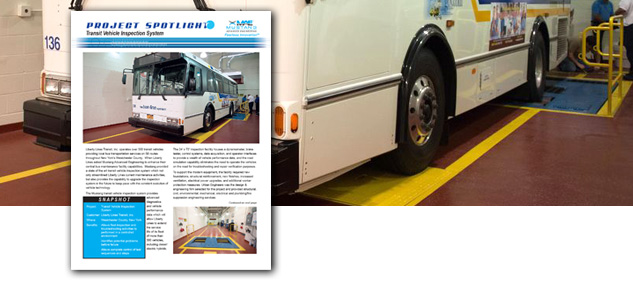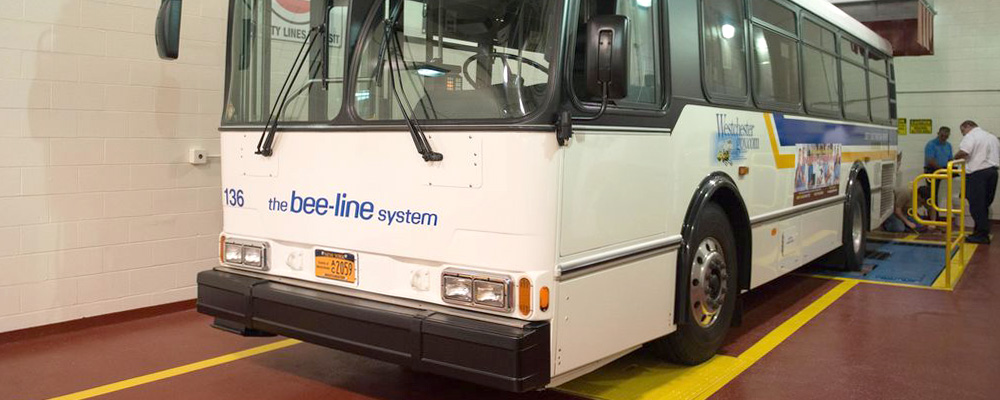Liberty Lines Transit, Inc. operates over 300 transit vehicles providing local bus transportation services on 58 routes throughout New York’s Westchester County. When Liberty Lines asked Mustang Advanced Engineering to enhance their central bus maintenance facility capabilities, Mustang provided a state of the art transit vehicle inspection system which not only streamlined Liberty Lines current maintenance activities, but also provides the capability to upgrade the inspection system in the future to keep pace with the constant evolution of vehicle technology.
The Mustang transit vehicle inspection system provides advanced diagnostics and vehicle performance data which will allow Liberty Lines to extend the service life of its fleet of more than 300 vehicles, including diesel/electric hybrids. The 24’ x 72’ inspection facility houses a dynamometer, brake tester, control systems, data acquisition, and operator interfaces to provide a wealth of vehicle performance data, and the road simulation capability eliminates the need to operate the vehicles on the road for troubleshooting and repair verification purposes.
To support the modern equipment, the facility required new foundations, structural reinforcement, new finishes, increased ventilation, electrical power upgrades, and additional worker protection measures. Urban Engineers was the design & engineering firm selected for the project and provided structural, civil, environmental, mechanical, electrical and plumbing/fire suppression engineering services.
Along with the inspection system hardware, Mustang provided custom software driven inspection processes for each of the many different models of vehicles operated by Liberty Lines. This data driven approach eliminates the subjectivity of the operator from the inspection procedures.
The transit vehicle inspection system selected by Liberty Lines is a two stage configuration. The first stage operations are performed on the heavy duty chassis dynamometer which can execute a multitude of tests including wheel force test, torque tests, down shift test, up shift test. horsepower tests, acceleration tests, speedometer test, etc. Stage 1 can also be used for troubleshooting vehicles by operating in manual mode which offers the technicain the ability to operate the vehicle in road simulation mode, constant speed mode, constant power mode, and manual load mode.
Stage 2 operations are performed on the heavy duty brake tester which thoroughly exercises the vehicle’s braking system and measures individual wheel drag and braking forces.
The data collected provides wheel drag measurement, wheel ovality, wheel to wheel braking balance per axle, and axle to axle braking balance.
During the inspection process, Mustang’s software/control system is connected to the vehicle’s ECU through the diagnostic port and scans and stores any error codes, and monitors engine rpm and other vehicle parameters desired by Liberty Lines.
The Mustang inspection system software guides the technician through the appropriate test sequence based on vehicle VIN, collects all data, performs pass/fail decisions, generates a printed report, and saves all information in a database. The Mustang software package also allows Liberty Lines to add/delete/modify test sequences, as well as individual sequence steps.
“MAE provided more than just equipment, the knowledge and expertise required to execute this project are as invaluable as the products themselves,” said David Ganzhorn, V.P. Sales of Mustang Advanced Engineering.
To Download this Project Spotlight as a PDF, click here!


